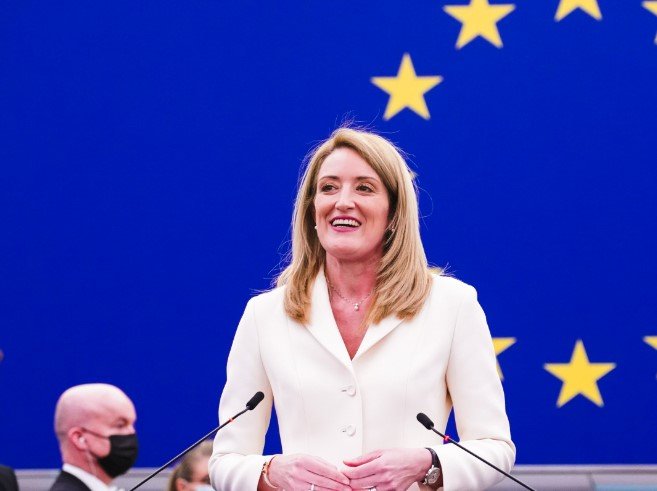Ursula von der Leyen has been re-elected for a second term as President of the European Commission, securing 401 votes in the European Parliament. Her re-election marks a continuation of her leadership during a period marked by significant challenges, including the COVID-19 pandemic, the war in Ukraine, and ongoing climate crises. Von der Leyen’s leadership has been characterized by her strong stance on European unity and her commitment to addressing both internal and external threats to the EU. Her re-election is seen as a vote of confidence in her ability to navigate the complex political landscape of the European Union.
Leadership During Crisis
Ursula von der Leyen’s first term as President of the European Commission was defined by her handling of multiple crises. One of the most significant challenges was the COVID-19 pandemic, which required swift and coordinated action across the EU. Von der Leyen played a crucial role in securing vaccines and coordinating the distribution efforts among member states. Her leadership was instrumental in ensuring that the EU could respond effectively to the health crisis, despite initial setbacks and criticisms.
Another major challenge during her tenure was the war in Ukraine. Von der Leyen positioned herself as a staunch supporter of Kyiv, advocating for strong sanctions against Russia and providing military and humanitarian aid to Ukraine. Her firm stance on this issue helped to solidify the EU’s position on the international stage and demonstrated the bloc’s commitment to defending democratic values and sovereignty. This approach has earned her both praise and criticism, reflecting the complex nature of international diplomacy.

Climate change has also been a key focus of von der Leyen’s presidency. She has championed the European Green Deal, aiming to make Europe the first climate-neutral continent by 2050. This ambitious plan includes significant investments in renewable energy, sustainable agriculture, and green technologies. Von der Leyen’s commitment to addressing climate change has been a defining feature of her leadership, aligning with the growing global emphasis on environmental sustainability.
Political Support and Opposition
Von der Leyen’s re-election was supported by a broad coalition of political groups within the European Parliament. She received backing from the center-right European People’s Party, the Socialists, and the liberals of Renew Europe. This coalition reflects a consensus among mainstream pro-EU groups on the importance of continuity and stability in the Commission’s leadership. The support from these groups was crucial in securing her re-election, as she needed a majority of at least 361 votes in the 720-seat chamber.
However, her re-election was not without opposition. Some lawmakers within these centrist groups expressed reservations about her leadership, forcing her to seek additional support from outside her current coalition. The Greens played a key role in her re-election, providing the necessary votes to secure her second term. This support from the Greens highlights the importance of environmental issues in the current political landscape and von der Leyen’s ability to build alliances across party lines.
On the other hand, right-wing parties, such as Italy’s Brothers of Italy, opposed her re-election. They argued that her policies were not aligned with their principles, particularly regarding issues like immigration and national sovereignty. This opposition underscores the ongoing political divisions within the EU and the challenges von der Leyen will face in her second term. Balancing the diverse interests of member states and political groups will be a critical task for her administration.
Future Challenges and Priorities
As von der Leyen embarks on her second term, she faces a range of challenges and priorities. One of the most pressing issues is the ongoing war in Ukraine. Ensuring continued support for Ukraine, both militarily and economically, will be crucial in maintaining the EU’s stance against Russian aggression. Von der Leyen will need to navigate the complexities of international diplomacy and work closely with EU member states to sustain a unified approach.
Climate change remains a top priority, with the implementation of the European Green Deal being a central focus. Achieving the ambitious targets set out in the Green Deal will require significant investments and policy changes across the EU. Von der Leyen’s leadership will be critical in driving these efforts forward and ensuring that the EU remains a global leader in environmental sustainability.
Economic recovery from the COVID-19 pandemic is another key challenge. The EU’s recovery plan, NextGenerationEU, aims to support member states in rebuilding their economies and addressing the social and economic impacts of the pandemic. Von der Leyen will need to oversee the effective implementation of this plan, ensuring that funds are allocated efficiently and that recovery efforts are inclusive and sustainable.
In addition to these challenges, von der Leyen will need to address ongoing issues such as migration, digital transformation, and strengthening the EU’s global influence. Her ability to build consensus and navigate the complex political landscape of the EU will be crucial in achieving these goals. As she begins her second term, von der Leyen’s leadership will be tested by the myriad challenges facing the European Union, but her re-election signals a strong mandate to continue her work.
